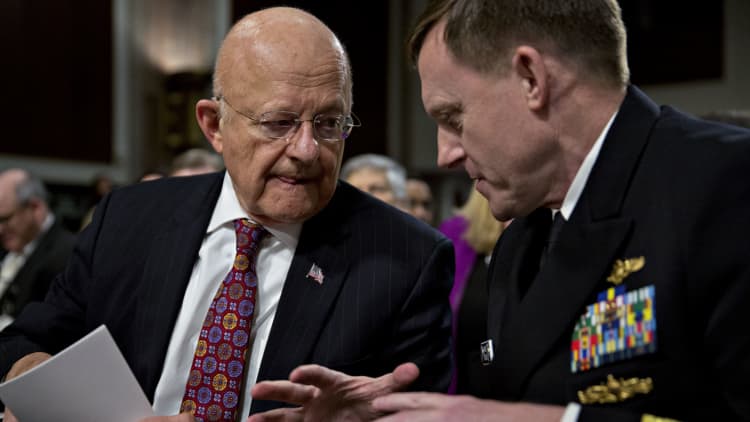
The head of U.S. intelligence told a Senate committee Thursday that Russia poses "an existential threat to the United States."
James Clapper made the comment while testifying about Russian hacking during the presidential campaign.
"I don't think that we have ever encountered a more aggressive or direct campaign to interfere in our election process," the director of national intelligence told the Senate Armed Services Committee.
But Clapper also said the Russian hacking efforts "did not change the vote tallies" in the election, which ended with Donald Trump's victory. Clapper was referring specifically to the question of whether voting machines could have been manipulated to affect the outcome.
Clapper added that when it comes to the the question of whether Russian hacking affected "the choices that the electorate made ... there's no way for us to gauge that."
"Russia clearly has assumed an even more aggressive cyber posture," Clapper said.
He said later: "They do pose an existential threat to the United States."
Clapper told the committee that a forthcoming intelligence report "will ascribe a motivation" by Russian President Vladimir Putin for the hacking. But he said he did not want to "pre-empt" the report by revealing the suspected motivation.
President Barack Obama has been briefed on the report, a senior intelligence official told NBC News. Obama last week ordered a series of retaliatory steps against Russia for the hacking.
During the hearing, the price of VanEck Vectors Russia, an exchange-traded fund that seeks to replicate the price of the DAXglobal Russia+ Index of larger Russian companies, fell more than 1.5 percent. The decline put the ETF on pace for its first negative day since Dec 19, when RSX lost 2.23 percent.
Questions about Russian interference have swirled furiously since Trump's victory over Democrat Hillary Clinton in November.
While the intelligence community believes top Russian officials were behind cyberattacks aimed at Clinton, Trump has been dismissive of those claims. Trump's backers also have seen the claims as an attack on the legitimacy of his election, but some Republicans have insisted that the matter must be thoroughly investigated.
"Every American should be alarmed by Russia's attacks on our nation," committee Chairman Sen. John McCain, R-Ariz., said at the start of the hearing.
"There is no national security interest more vital to the United States of America than the ability to hold free and fair elections without foreign interference."
Cyber Command Chief Adm. Mike Rogers said that the hacking of America's election system and process "is of great concern."
The committee's cyberthreats hearing comes a day before the president-elect receives a briefing by the CIA and FBI directors — along with the head of national intelligence — on the investigation into Russia's alleged hacking efforts.
Sen. Jack Reed, D-R.I., said at the hearing that he believes "the best approach" is to create a special select committee of the Senate to probe such efforts.
Trump has criticized the intelligence community's findings and even seemed to back WikiLeaks founder Julian Assange's contention that Russia did not provide him with hacked Democratic emails. Responding to previous reports that U.S. intelligence had concluded that Russia was behind hacks of Democratic Party officials during the election, Trump scoffed at the agencies for incorrectly reporting before the Iraq War that Saddam Hussein had amassed weapons of mass destruction.
Trump spokesman Sean Spicer on Thursday denied reports that Trump is planning to restructure the intelligence community infrastructure. And Trump himself tweeted that he was "a big fan" of intelligence.
McCain discussed Assange with Clapper early in the hearing, saying: "I believe he is the one who's responsible for publishing the names of individuals who work for us who put us in direct danger."
"Yes, he has," Clapper replied.
"Do you think there's any credibility we should attach to this individual?" McCain asked.
Clapper said, "Not in my view."
"I second those comments," Rogers said.
Sen. Claire McCaskill, D-Mo., asked Clapper about how Trump has been dismissive of the intelligence community's findings of Russian interference in the election.
"I think there's a difference between skepticism and disparagement," Clapper said.



